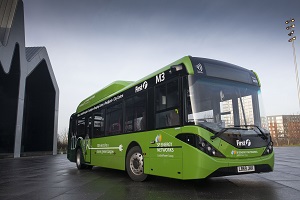Feasibility studies are to be held into projects to further reduce transport emissions in Bristol, including using electric buses, a new park and ride for the M32 and many more electric vehicle charging points.
The studies, along with others such as greater use of e-cargo bikes and installation of more on-street bike hangars, will be paid for out of a £500,000 investment to make Bristol a Zero Emission Transport City. 
The government funding has been secured following a bid co-ordinated by the West of England Combined Authority (WECA). Bristol is one of only three cities to be awarded the money.
The projects, which are aimed at improving Bristol’s transport network and reducing carbon emission, will boost Bristol’s ambition to give people and companies more affordable and reliable options to travel and transport goods in a sustainable way.
Metro Mayor Dan Norris, who leads WECA, said these could include installing 1,000 cycle hangars, increasing electric charging units and introducing 250 electric buses across the city.
“Working in close collaboration with the Mayor of Bristol Marvin Rees I am delighted that Bristol has won funding to become a Zero Emission Transport City.
“This is important to enable us to reach our ambitious net zero targets and will mean more local people breathe cleaner air and lead healthier lives.”
Mayor Rees added: “As the first city in the UK to declare a climate emergency, I am delighted we are taking the lead in becoming a zero emission transport city.
“To build a sustainable transport network we need to fundamentally transform the ways we all move around the city and region.
“These proposals demonstrate our vision to help us achieve net zero by 2030. That we were invited to bid for this money by the Department for Transport is a real sign that our efforts to reduce emissions are recognised at a national level.
“We’re taking bold steps to reduce emissions and encourage a diverse transport mix including introducing a bus gate at Bristol Bridge, investing in cycling, expanding park and ride and agreeing a major bus deal with local operators.
“This money will provide the platform to move us onto the next phases of delivering sustainable and low-carbon transport networks that benefit everyone.”
The feasibility studies will look into:
- Installing charging points at council-run car parks and popular destinations
- Speeding up the rollout of mobility hubs that pool shared transport providers at a single location
- Developing a new Bristol Cycling Centre in Lawrence Weston
- Progressing a new park and ride for the M32.
- Reducing emissions from transport in the city centre
- Electrifying a large proportion of Bristol’s bus fleet
- Installing on-street cycle hangars across the city
- Encouraging more use of freight consolidation centres
- Investing in ‘last-mile’ solutions, such as e-cargo bikes
The other cities to be awarded Zero Emission Transport funding are Oxford and Norwich.






























